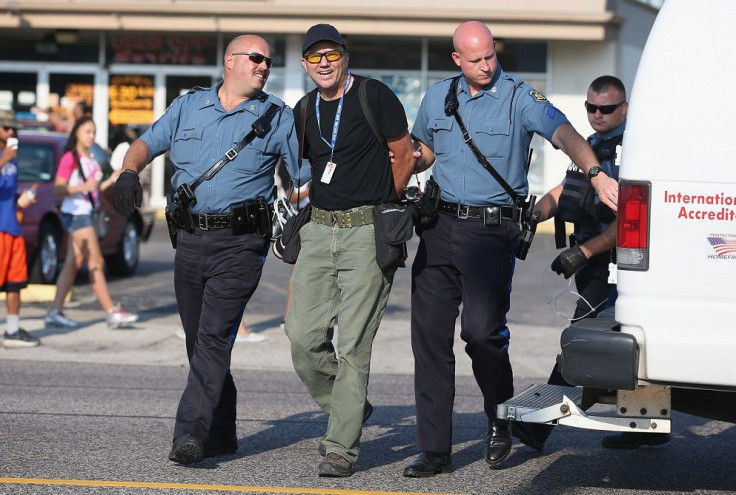Ferguson And The Media: Is Mike Brown’s Death Being Overshadowed By Press Censorship, Arrests?

Eleven days after Michael Brown was fatally shot by police in Ferguson, Missouri, some news watchers are accusing journalists of making themselves a bigger story than the one they ostensibly came to cover. The media is always part of any news story, of course, but as reporters insert themselves and the issue of press freedom into the Ferguson narrative, do they risk obscuring the issue of entrenched racism that arose with the killing of an unarmed black man at the hands of a white police officer?
Possibly, says Katy Culver, associate director of the University of Wisconsin-Madison Center for Journalism Ethics. “If we turn our attention too much toward what’s happening to the news media, then we’ve really not sought the truth and reported it,” she told International Business Times. “This story is about Michael Brown, not two reporters who got arrested at a McDonald’s. I’m not saying that’s unimportant, but it’s not the most important thing.”
Following several days of civil unrest in Ferguson -- a predominantly black St. Louis suburb served by a mostly white police force -- media reports from the ground took a self-referential turn last week when reporters for the Huffington Post and the Washington Post were arrested at a McDonald’s restaurant near the protest site. As the reporters live-tweeted their confrontations, the problem of press censorship suddenly threatened to overshadow the core issue of Brown’s death.
And as the situation in Ferguson has escalated over the last several days, more journalists have seized the opportunity for daring, first-person expositions, whether it was Al Jazeera America posting video footage of one of its reporters fleeing tear gas, or CNN’s Don Lemon getting into a confrontation with police on the front lines of a protest. By Tuesday morning, many observers mused that protesters in Ferguson may now be outnumbered by grandstanding reporters flooding Twitter and Instagram with live updates.
Noah Rothman, a writer for the conservative news site Hot Air, echoed that concern on Tuesday in a widely shared article, noting that the media, while having both a “right and a responsibility” to report from the ground and keep law enforcement in check, may be treading into dangerously vain territory in Ferguson. “[T]he press is no longer serving as objective chroniclers of the proceedings,” Rothman wrote. “In many ways, the media appears to believe that it is an active participant in the events in Missouri. What’s more, the press appears to be relishing this role.”
Journalists are not altruists. Like anyone working in a highly competitive field, they can be driven by ego, ambition and even a desire for petty one-upmanship -- all of which, Culver noted, can be amplified on Twitter, where the barriers between reporters’ egos and news consumers are virtually nonexistent. “I do think there is the potential for social media to make it more about ‘me,’” Culver said. “We are in much more of an age of brand personalities for individual reporters. I think it’s something that news outlets are encouraging, and I don’t think it’s necessarily all bad.”
It’s worth pointing out that most of the people covering Ferguson are domestic reporters who have likely not covered active combat zones. To them, tear gas may seem like a bigger deal than it would to someone covering the Gaza conflict -- but then tear gas being fired at American citizens is a big deal. Moreover, Culver stressed that journalists have a legitimate interest in reporting on the numerous instances of willful press censorship that have taken place at the hands of Ferguson’s militarized police force. It’s highly troubling aspect of the story, she said, and one that separates the Ferguson protests from other domestic crises in recent memory.
“There is a real story here about what is happening to journalists in Ferguson,” Culver said. “I can’t remember seeing this kind of crackdown on reporters by U.S. police.”
But in focusing too heavily on that crackdown, reporters do run the risk that they will be seen as opportunists exploiting a community that has been acting out of a desperation and rage that few journalists can truly understand. And based on some of the social media chatter, they’ve already passed that point.
“After CNN and MSNBC reporters get blacks to destroy Ferguson, they'll laugh and return to their homes in white communities,” one person remarked.
“So the nation starts paying attention when two white people are arrested?” said another.
Those tweets get at the heart of what Culver called the “critical ethical element” upon which covering Ferguson hinges: Understanding how what is happening to the media in Ferguson relates to the larger treatment of its citizens. “I could go parachute into Ferguson right now and have little to no understanding of what it actually means to be living there and dealing with that police force,” she said.
Got a news tip? Email me. Follow me on Twitter @christopherzara.
© Copyright IBTimes 2025. All rights reserved.






















